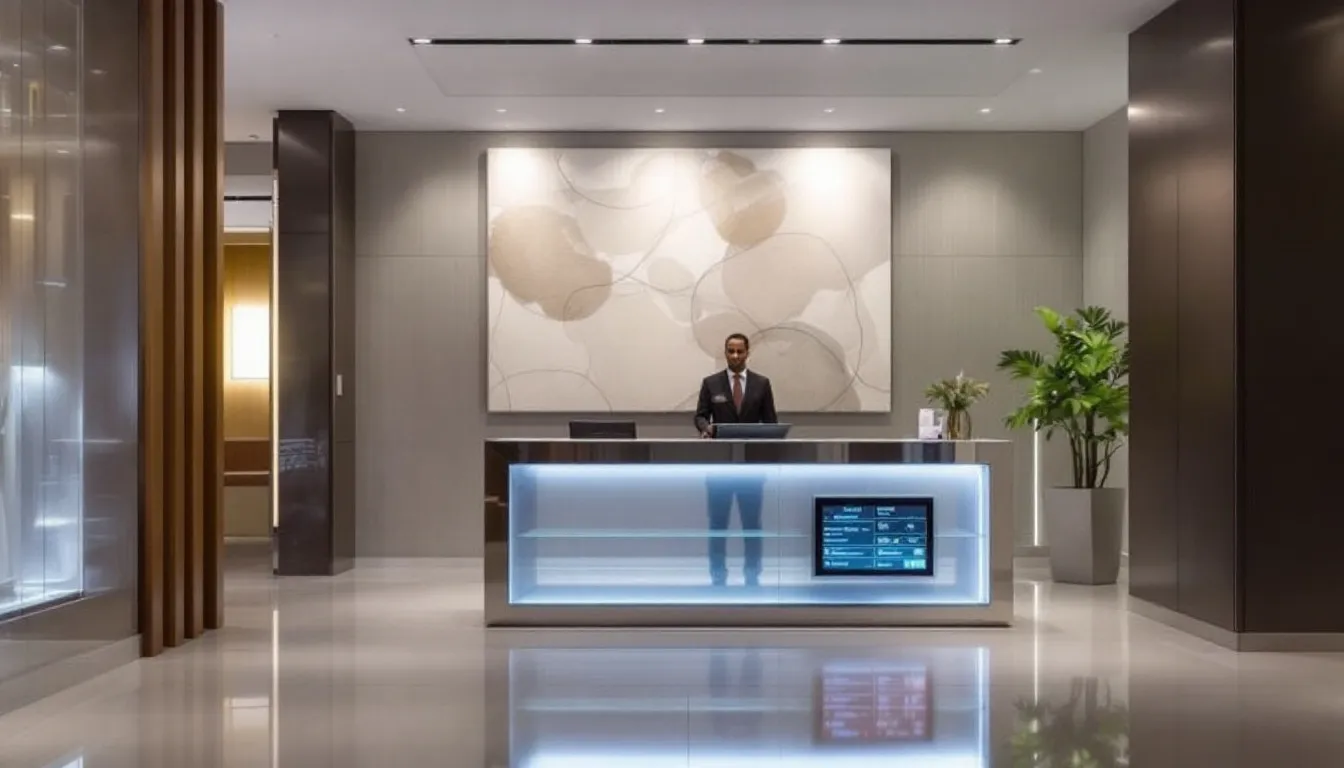USALI Explained: Uniform System of Accounts for Lodging
Sep 4, 2025
 Mika Takahashi
Mika TakahashiPopular Categories
Hotel Technology & InnovationHotel Operations OptimizationDigital MarketingIndustry TrendsRevenue ManagementHospitality Industry
Popular Categories
Trending Post

Hotel Walk Letter Template: Professional Guest Communication

Online Travel Agents: What They Are and How They Work

Hotel Security Systems: Modern Protection Solutions

Hotel Advertising: Complete Guide to Boost Bookings and Revenue

25 Hotel Marketing Strategy Ideas for 2025: Complete Guide

AI Reservation Agent: Revolutionizing Hotel Booking and Guest Experience

PMS Communication: Streamlining Property Management Through Effective Guest Messaging
Table of contents
In the hospitality world, having consistent financial practices isn’t just a nice-to-have—it’s absolutely vital for success. Almost every major hotel in the U.S. relies on one key accounting framework to gauge performance and make important business decisions. That framework is USALI accounting. Getting a good grasp of it can be the difference between running a thriving hotel and one that struggles to keep up.
Whether you're a hotel owner checking how your property is doing, part of a management company handling multiple locations, or a financial pro working in hospitality, knowing the ins and outs of the uniform system of accounts for the lodging industry is essential. This guide covers everything you need to know about USALI accounting—from its roots to the latest updates in the 12th revised edition.

What is USALI Accounting?
USALI stands for Uniform System of Accounts for the Lodging Industry—a standardized hotel accounting framework tailor-made for hotels and lodging properties. This system sets out consistent financial reporting standards, making it possible for hotels to compare performance across different properties, markets, and management companies with impressive accuracy.
It’s built to align with generally accepted accounting principles (GAAP), but it also tackles the unique needs of the hospitality industry. Unlike typical accounting systems that mainly focus on external reporting for shareholders or creditors, USALI zeroes in on operational metrics and departmental performance—exactly the kind of info hotel managers need to make smart decisions.
The system is now in its 12th revised edition, published in February 2025, with mandatory adoption kicking in on January 1, 2026. It’s the result of nearly a century of growth in hospitality financial and managerial accounting. Hospitality Financial and Technology Professionals (HFTP) and the American Hotel & Lodging Association work together to keep USALI up to date with industry trends and new business models.
What makes USALI so powerful is its ability to turn complex hotel operations into comparable financial data. This means hotel owners, managers, and operators can make informed choices based on consistent, trustworthy financial info—no matter the property type or market.
Historical Development and Evolution
USALI’s story starts back in 1926. The Hotel Association of New York City spotted a big problem: hotels were all using different accounting methods, making it almost impossible to compare how they performed or set industry benchmarks. This lack of uniformity held back professional hotel management and made it harder to secure funding for new projects.
What began as a local fix soon grew into a national—and eventually global—standard for lodging industry accounting. The first version laid down key principles that still guide hospitality accounting today: departmental profit and loss reporting, standardized revenue and expense categories, and operational metrics designed for hotel business analysis.
Over the years, USALI has gone through 12 major updates to keep pace with changing industry needs and new technology. It expanded to cover everything from traditional full-service hotels to all-inclusive resorts, extended-stay properties, and mixed-use developments.
A turning point came in 2018 when HFTP took over the copyright for USALI, cementing its role as the go-to source for hospitality accounting standards. This move made sure USALI would keep evolving alongside the industry instead of becoming outdated.
Today, the Global Finance Committee—made up of finance leaders from international brands, management companies, asset managers, educators, and consultants—steers USALI’s development. This team ensures updates address the real challenges hotels face, while keeping the consistency that makes USALI so valuable for comparative analysis.
Core Benefits of USALI Accounting
To understand why USALI accounting is the industry standard, let’s look at the key benefits and how they impact hotel operations in real life.
Financial Uniformity and Consistency
The biggest advantage of USALI is the true financial uniformity it brings across all kinds of hotel properties. By standardizing accounting methods, it removes the guesswork about whether differences in financial results come from actual performance or just different accounting styles. This gives hotel owners and management companies reliable data to base strategic decisions on.
With USALI, key metrics like RevPAR (Revenue per Available Room), ADR (Average Daily Rate), labor cost percentages, and departmental profit margins are comparable across hotels no matter their size, location, or brand. This consistency is especially helpful for management companies running multiple properties—they can spot best practices and replicate success more easily.
The standardized account setup also makes financial reporting smoother and faster. Hotels spend less time on month-end closings and meeting annual mandatory brand reporting requirements because automated systems can generate consistent financial statements without tons of manual tweaks.
Enhanced Benchmarking Capabilities
USALI opens the door to meaningful benchmarking that can drive real improvements. Hotels can confidently compare themselves to industry averages, competitors, and market data from sources like STR Global, knowing the comparisons are apples-to-apples.
Standardized performance metrics help set realistic goals and guide strategic planning based on proven benchmarks. Managers can pinpoint exactly where their hotel shines or falls short compared to peers, so they can focus improvement efforts where it counts.
The detailed expense categories let hotels dive deep into cost centers, understanding not just if they're doing well, but where they can cut costs or invest more. This kind of data-driven insight can boost both profitability and guest satisfaction.
Improved Access to Capital and Financing
When it comes to financing, USALI-formatted financials are a big plus. Banks and investors prefer standardized operating statements because they reduce uncertainty and build confidence in hotel financial reporting.
Lenders can assess risk and value properties more accurately with USALI reports, which follow widely recognized accounting protocols. This speeds up due diligence and often leads to quicker loan approvals and better terms.
The transparency USALI offers can even help hotels negotiate improved financing because investors clearly see how financial info is categorized and presented.

12th Revised Edition: Key Updates and Changes
The 12th edition brings important updates that reflect how hotels operate today and respond to new industry trends.
Enhanced Sustainability Reporting
One major change is renaming the old “Utilities” department to “Energy, Water, and Waste,” along with new environmental KPIs. This shift highlights the growing importance of sustainability and answers the call from corporate clients and investors for environmental accountability.
Hotels can now track energy use in kilowatt hours, water consumption in liters, renewable energy percentages, and waste diversion rates. These new metrics support ESG (Environmental, Social, Governance) reporting, which is increasingly vital for hotel investment and management.
By standardizing sustainability reporting alongside financial metrics, USALI helps hotels meet regulations and guest expectations for eco-friendly operations.
All-Inclusive Resort Accounting
The 12th edition also adds a dedicated section for all-inclusive hotels and resorts. This recognizes the unique accounting needs of these properties and offers guidance on breaking down package revenues and allocating costs for inclusive services.
New revenue categories specific to all-inclusive models help these hotels report their financials accurately and benchmark against similar properties. From food and beverage to entertainment costs, the guidance covers it all.
This tailored framework keeps all-inclusive hotels aligned with traditional accounting practices while allowing fair comparisons across different lodging types.
Labor Cost Transparency and FTE Reporting
Labor is often the biggest expense for hotels, and the 12th edition introduces a supplemental report breaking down labor costs by department and role. It also adds full-time equivalent (FTE) calculations, which standardize staffing comparisons across properties of different sizes.
This level of detail helps owners understand labor policies better and find ways to improve efficiency. It supports smarter workforce planning by showing exactly where labor dollars are spent and how productive staff are.
Management companies benefit from this too, as they can compare staffing levels and productivity across their portfolio more accurately.
Brand and Management Company Cost Reporting
Another important update is a new schedule to track fees charged by hotel brands and management companies. This shines a light on often hidden costs like platform support, marketing, and technology fees.
By making these operator costs transparent, hotels can plan budgets better and negotiate contracts with more confidence. It also helps owners evaluate the total cost of brand affiliations and management agreements.
Implementation and Technology Integration
Rolling out USALI accounting takes more than just updating your hotel chart of accounts—it requires aligning your technology and training your team.
Property Management System (PMS) Alignment
Many PMS and POS systems need reconfiguration to follow USALI standards automatically. For example, early check-in fees might be mistakenly recorded as room revenue instead of miscellaneous income, which can skew key metrics.
Having a USALI-aligned system means transactions get categorized correctly from the start, speeding up month-end closes and reducing errors. This is especially important as hotels add new revenue streams like digital subscriptions or executive lounge fees.
Work closely with your tech vendors to make sure your systems support the new expense categories and revenue classifications introduced in the 12th edition. This prevents data quality issues that could throw off your financial reports and benchmarking.
Compliance Requirements and Deadlines
The 12th edition becomes mandatory January 1, 2026, but early adoption is allowed. Hotels need to update accounts, reporting templates, and software well before the deadline.
Training isn’t just for accountants—front office staff, department heads, and general managers also need to understand how their daily work affects financial reporting under the new rules.
During the transition, comparison to past performance might be tricky if historical data isn’t adjusted. Many hotels run parallel reporting to keep analysis consistent during this period.

Impact on Hotel Operations and Decision Making
USALI changes how hotels look at performance and make strategic choices by providing detailed, standardized financial data that supports smart management.
Departmental Performance Analysis
USALI gives line-by-line financial data for every department—rooms, food and beverage, spa, and more. This detailed view helps identify which areas are profitable and which need investment or operational tweaks.
Managers can see expenses as a percentage of revenue for each department, helping them allocate resources wisely. The detailed expense dictionary ensures cost comparisons reflect real operational differences, not just accounting quirks.
When department heads have access to consistent, comparable data, they can take ownership of their results and drive targeted improvements.
Revenue Management and Pricing Strategy
Standardized revenue recognition helps hotels analyze pricing and profitability accurately. USALI makes it easier to calculate profit margins and contribution by revenue stream, supporting dynamic pricing strategies.
Tracking ancillary revenues helps hotels focus on total revenue per available room (TRevPAR), not just traditional room revenue. This broader view supports revenue optimization across all hotel services.
Cash flow analysis becomes more reliable with consistent revenue and expense recognition, aiding better forecasting and budgeting.
Future Outlook and Industry Trends
USALI will keep evolving alongside hospitality trends like technology adoption and new revenue models that meet changing guest expectations.
Sustainability reporting will grow in importance as hotels face more pressure to show measurable progress on environmental goals. Future USALI updates will likely expand these requirements.
Data analytics and real-time reporting will become bigger parts of USALI, helping hotels manage daily operations more responsively.
Emerging tech like AI and blockchain could further boost financial transparency and automate complex reporting, possibly enabling real-time USALI reports for immediate operational decisions.
With more international adoption, USALI is becoming the global standard for hospitality financial reporting. As hotel brands grow worldwide, consistent financial reporting across markets is crucial for managing global portfolios.
The uniform system of accounts remains the backbone of lodging industry financial management—helping hotels analyze internally, report externally, and benchmark performance to drive excellence. Hotels that master USALI accounting will be well-positioned to succeed in an increasingly competitive and complex landscape.
